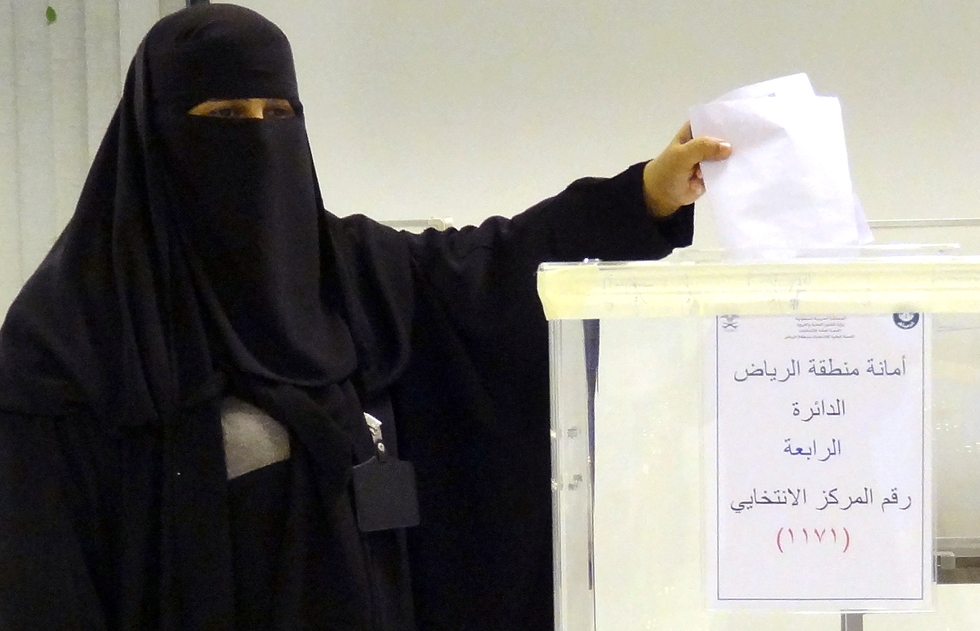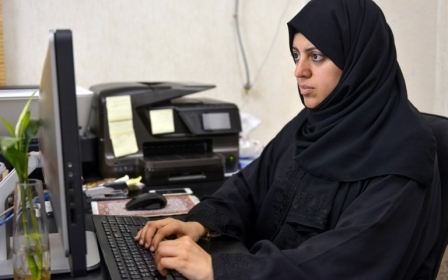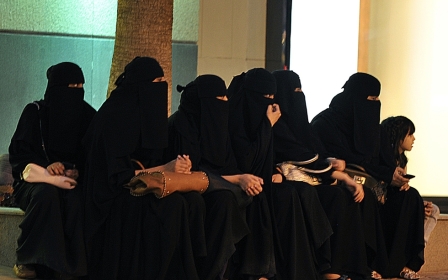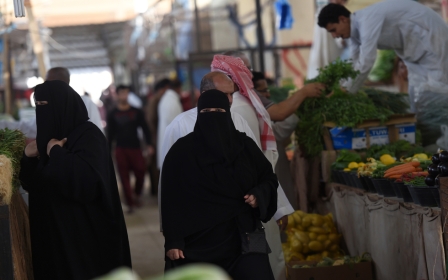Saudi holds first ever election open to women

by Ian Timberlake and Karim Abou Merhi
Covered from head-to-toe and driven by male guardians, Saudi women voted Saturday for the first time, in a tentative step towards easing sex discrimination in the ultra-conservative Islamic kingdom.
In another first, women were allowed to stand as candidates in the polls for municipal councils, the country's only elected public chambers.
"Now women have a voice," Awatef Marzooq told AFP after casting her ballot for the first time at a school in the capital.
"I cried. This is something that we only used to see on television taking place in other countries."
Despite the presence of female contenders on the ballot sheet for the first time, Marzooq said she had picked a male candidate because of his ideas including more nurseries.
"I voted for a man, but I hope a woman will win," she said.
Saudi Arabia, an absolute monarchy with some of the world's tightest restrictions on women, including a ban on driving, was the last country to allow only men to vote.
In a reminder of the continued gap between the two sexes, polling stations were segregated.
Outside one centre in Riyadh for women, a succession of cars driven by men brought female voters dressed in black robes.
Most of the women asked the media not to take their photograph before they were whisked away.
'Breaking the barrier'
Mohammed al-Shammari, who had just dropped off his daughter, a teacher, said he had encouraged her to vote.
"We want to break this barrier," he said.
"As long as she has her own place and there is no mixing with men, what prevents her from voting? We support anything that does not violate sharia (Islamic law)," he said.
More than 900 women are running, competing with nearly 6,000 men for seats. They have had to overcome a number of obstacles to participate in the landmark poll.
Gender segregation enforced at public facilities meant that female candidates could not directly meet any male voters during their campaigns.
Women voters said registration was hindered by bureaucratic obstacles, a lack of awareness of the process and its significance, and the fact that women could not drive themselves to sign up.
As a result, women account for less than 10 percent of registered voters and few, if any, female candidates are expected to be elected.
"To tell you the truth, I'm not running to win," said Amal Badreldin al-Sawari, 60, a paediatrician in central Riyadh.
"I think I have done the winning by running."
One-third of seats on Saudi Arabia's 284 councils are appointed by the municipal affairs ministry, leaving women optimistic that they will at least be assigned some of them.
Aljazi al-Hossaini waged her 12-day campaign largely over the Internet, putting her manifesto on her website where both men and women could see it.
"I did my best, and I did everything by myself," said the 57-year-old management consultant, running in the Diriyah area on the edge of Riyadh.
But not all women trying to break the mould in the conservative kingdom had such a positive experience.
As campaigning began last month, three activists said they had been disqualified from running.
They included Loujain Hathloul, who spent more than two months in jail after trying to drive into the kingdom from the United Arab Emirates late last year, in a case that attracted worldwide attention.
An appeals committee reversed her disqualification just two days before the end of campaigning, Hathloul said on Twitter.
'Lack of information'
At a male polling centre in central Riyadh, Ahmad Soulaybi, 78, said he did not know enough about female candidates in his region to support any.
"I voted for a man because I lack information about the women," he told AFP.
According to election commission data, nearly 1.5 million people aged 18 and over are registered to vote.
This includes about 119,000 women, out of a total native Saudi population of almost 21 million.
Oil-rich Saudi Arabia boasts modern infrastructure of highways, skyscrapers and ever-more shopping malls.
But women still face many restrictions, and must get permission from male family members to travel, work or marry.
Ruled by the al-Saud family of King Salman, Saudi Arabia has no elected legislature and faces intense Western scrutiny of its rights record.
A slow expansion of women's rights began under Salman's predecessor Abdullah who announced four years ago that women would join the elections this year.
The kingdom's first municipal ballot was in 2005, for men only.
Polls close at 5:00 pm, with counting on Sunday.
Stay informed with MEE's newsletters
Sign up to get the latest alerts, insights and analysis, starting with Turkey Unpacked
Middle East Eye delivers independent and unrivalled coverage and analysis of the Middle East, North Africa and beyond. To learn more about republishing this content and the associated fees, please fill out this form. More about MEE can be found here.




